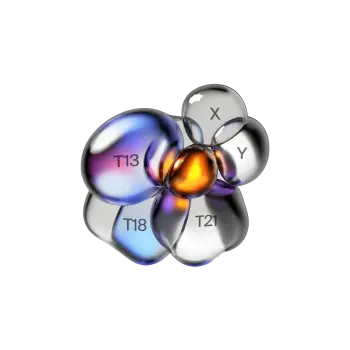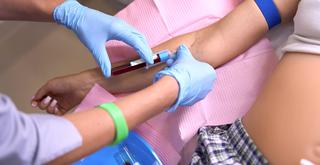Chromosome 21 is one of the 23 pairs of chromosomes found in the body's cells and is crucial for our development and health. Chromosome 21 contains approximately 47 million base pairs, accounting for about 1.5% of all DNA in the body's cells. There are over 200 genes on chromosome 21, each playing an important role in regulating growth, organ development, and many other biological processes. Several of these genes influence essential functions such as heart and nervous system development, as well as learning and communication abilities.
Despite its importance, changes in the number or structure of chromosome 21 can lead to medical conditions. One of the most well-known genetic conditions related to this chromosome is Trisomy 21, commonly known as Down syndrome, where an individual has three copies of chromosome 21 instead of two. This leads to physical and cognitive changes. Down syndrome is often identified through prenatal tests, such as NIPT (Non-Invasive Prenatal Testing).
According to the National Institutes of Health (NIH), Trisomy 21 occurs in approximately 1 in 700 live births. This chromosomal abnormality is usually the result of a random event during the formation of eggs or sperm. In Sweden, about 120 babies are born with Down syndrome each year, which corresponds to approximately 1 in 800 births. Thanks to medical advancements, improved support services, and a more open-minded society, the quality of life for people with Down syndrome has improved significantly in recent decades.
Early Diagnosis of Down Syndrome, Trisomy 21
The diagnosis of Trisomy 21 can be made through several different methods:
Prenatal Testing
- NIPT: A commonly performed blood test during early pregnancy, where the mother provides a blood sample to analyze the fetus's DNA to identify various trisomies, including Trisomy 21. Other identification methods include:
- Ultrasound: Can detect certain physical signs of Trisomy 21.
- Amniocentesis: A sample of amniotic fluid is taken to identify chromosomal abnormalities.
- Chorionic Villus Sampling (CVS): A sample from the placenta is taken to analyze the fetus's chromosomes.
Postnatal Testing
After birth, the diagnosis can be confirmed through a blood test that analyzes the baby's chromosomes. Typically, a karyotyping test is performed to visualize the baby’s chromosome set and identify if the baby has Trisomy 21.
Parents of children with Down syndrome can be offered genetic counseling to receive more information about the condition and support in understanding future risks of Trisomy 21 in future pregnancies.

























